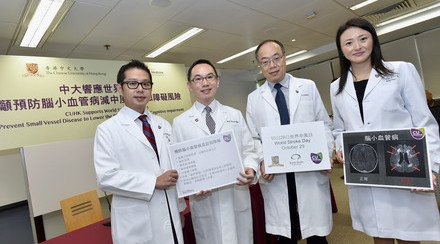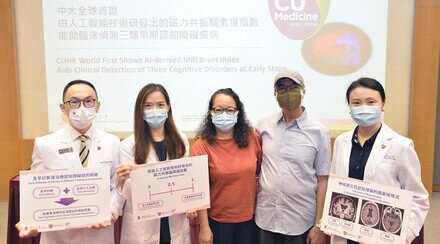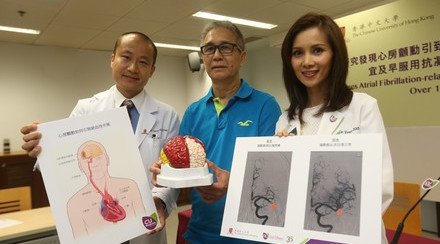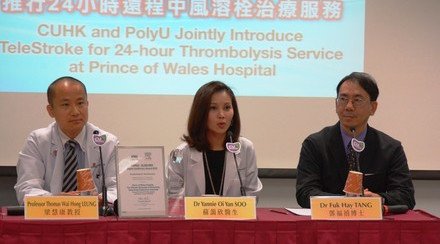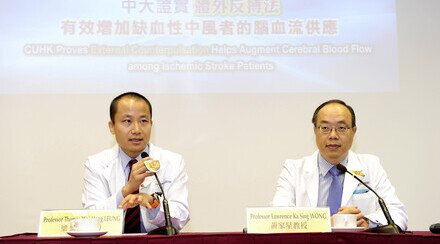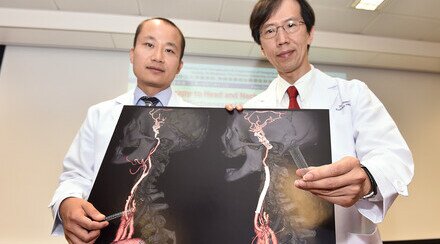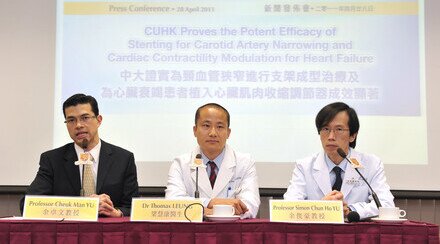CUHK Research Reveals that Stroke Triggers Alzheimer’s Dementia Risk of Alzheimer’s Dementia Can be Reduced by Enhancing Vascular Health
Recent research conducted by the Department of Medicine and Therapeutics at The Chinese University of Hong Kong (CUHK) reveals that cerebrovascular diseases are closely correlated with Alzheimer’s dementia. Patients with underlying Alzheimer’s dementia pathology have a 90% chance of developing dementia after a stroke. Findings of research suggest that enhancing vascular health can effectively prevent or delay the onset of Alzheimer’s dementia. The findings have been published recently in an international leading scientific publication, journal of Alzheimer’s and Dementia.
Alzheimer’s dementia is the most common neurodegenerative disease worldwide. There are over 35 million people worldwide, including 70,000 in Hong Kong suffering from this disease. The latter is expected to triple in the next 30 years due to aging problems.
Alzheimer’s dementia is characterized by progressive loss of cognition, such as memory, executive function and language. Pathologically, it is characterized by deposition of amyloid plaques in the brain. International researches show that one in every three senior citizens aged 65 or above has underlying amyloid plaques in the brain. According to the Census and Statistics Department of HKSAR[1], approximately 35,000 senior citizens in Hong Kong may have underlying amyloid plaques who may later develop Alzheimer’s dementia.
Traditionally, Alzheimer’s dementia and cerebrovascular disease (e.g. a stroke) are considered as two different diseases. A research team led by Prof. Vincent C.T. Mok,Division of Neurology, Department of Medicine and Therapeutics at CUHK, studied 1,013 Chinese subjects with an average age of 70 years who suffered from mild to moderate strokes between 2009 and 2010. The result showed that among those who were found to harbor amyloid plaques in their brains, 90% developed dementia after a stroke. Professor Mok explained, ‘From the emergence of amyloid plaques in the brain, it takes 10 to 15 years more on average for the patient to develop dementia. However, a very minor stroke, or even a transient ischemic attack, is able to trigger dementia onset in patients with underlying amyloid plaques. In other words, a stroke is a catalyst of the process. Early studies recognized that cerebrovascular disease is present in as many as 50% of Alzheimer’s dementia patients. Therefore, we believe that 50% of dementia can be prevented or delayed if cerebrovascular disease can be prevented, despite the lack of effective treatment towards amyloid plaques.’
Dr. Lisa Au, Clinical Tutor (Honorary), Division of Neurology, Department of Medicine and Therapeutics at CUHK, stated, ‘The present study provides strong evidence that cerebrovascular disease triggers Alzheimer’s dementia. Maintaining vascular health will not only lower the risk of cardiovascular and cerebrovascular disease, but also prevent dementia.’ Dr. Au also pointed out that preventive measures of cerebrovascular disease include treatment of hypertension and dyslipidemia, smoking cessation, increase of physical activity, weight reduction in obese individuals, adoption of a healthy diet and the use of anticoagulant drugs in subjects with atrial fibrillation.
Looking forward, the research team will further investigate the pathology of Alzheimer’s dementia including estimating the prevalence of amyloid plaques among dementia-free elderly subjects and evaluating whether certain drugs are able to clear up amyloid plaques or to prevent dementia onset among those with amyloid plaques.
[1]The Census and Statistics Department of HKSAR : http://www.censtatd.gov.hk/hkstat/sub/sp150_tc.jsp?tableID=002&ID=0&productType=8

Prof. Vincent C.T. Mok (right), Professor, and Dr. Lisa Au, Clinical Tutor (Honorary), Division of Neurology, Department of Medicine and Therapeutics, CUHK





